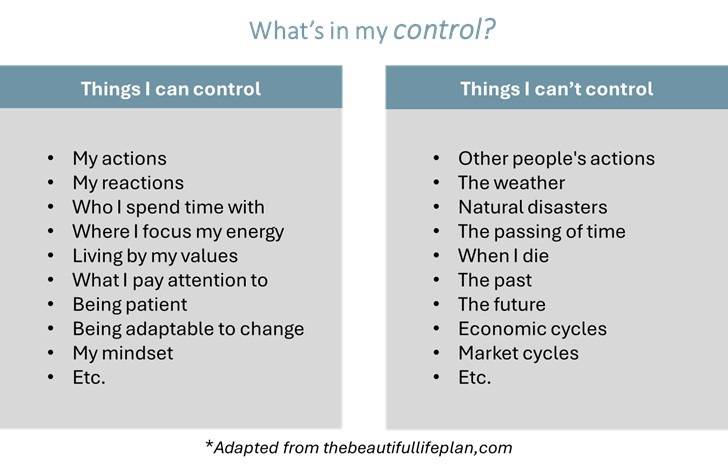The Illusion of Control

The world is complex and feels out of control.
Being human, we have a deep desire to be in control. We have a greater sense of wellbeing when we convince ourselves that we have control over events and outcomes even when this is not true. There are many aspects in our lives over which we do not have much control. The paradox is that although we don’t have much control, the illusion still creates a sense of wellbeing.
In pursuit of our desire to make an unpredictable world more predictable we convince ourselves that we can exert control over external uncontrollable events that impact our lives. This phenomenon is referred to as the illusion of control. The desire for control is a pervasive force that often shapes our actions, decisions, and perceptions. The quest for control is driven by a desire to shape outcomes in accordance with our preferences and expectations.
We confuse our deep desire to make the world predictable with our ability to do so. A persistent need for control may be linked to our difficulty of accepting uncertainty. By trying to exert control over every aspect of a situation, you are trying to create a sense of security and predictability.
The problem is that trying to control the uncontrollable leads to greater anxiety and stress, which is both exhausting and unproductive. It is crucial to recognize and accept the limits of our control. Holding tight to the illusion of control does not shield us from the uncertainties of life.
Acknowledging this illusion of control helps us to gain perspective between our choices and external forces. By recognizing the limits of our control, we can cultivate resilience, adaptability, and a deeper understanding of the complexities that shape our lives. Embracing the illusion of control does not mean surrendering to fate but rather adopting a mindset that values adaptability. It fosters resilience allowing us to weather the storms of uncertainty.
The “paradox of control” suggests that the more we try to control everything, the less control we have. Excessive control can lead to unintended consequences and a loss of overall influence.
Have you ever struggled to fall asleep? Only to find that the harder you try to fall asleep, the more difficult it becomes to actually fall asleep. We do have some control, but in certain areas we need to accept that we don’t have control. We become so focused on trying to control the uncontrollable that we lose sight of what is actually under our control.
“The more you try to control something, the more it controls you. Free yourself and let things take their natural course”. – Buddha
The key to breaking free from the paradox of control is to focus on what you can control. We can control our own actions, our own thoughts, and our own reactions to the world around us. By focusing on what we can control, we can begin to let go of our need to control everything else.
It is important to reflect on and understand clearly what it is beyond your control. We cannot control the external world.
Our best chance is to control our internal world – the space where decisions are made. Our thoughts and emotions have a direct impact on our behaviours and actions. It is our thoughts and emotions that separates humans from the animal kingdom. Stil, we fail to seek control over that which makes us unique – our thoughts and emotions.

The irony is that empowerment often emerges from surrendering to the fact that the world is inherently unpredictable. Accepting that some things are beyond our control frees up mental and emotional energy to focus on aspects of life that are within our sphere of influence. It allows us to respond more effectively to challenges, adapt to change, and foster a sense of resilience in the face of uncertainty.
We do not have control over geopolitical events, the economic cycle, or the short-term price movement of the markets. When we focus on external factors that are beyond our control, we become distracted from what we truly value.
External forces will defy our attempts to reign them in. Focus on what you can control and let go of the rest.
Wisdom lies in understanding when to assert influence and when to surrender gracefully.
The above article was written and adapted by Marius Kilian.






